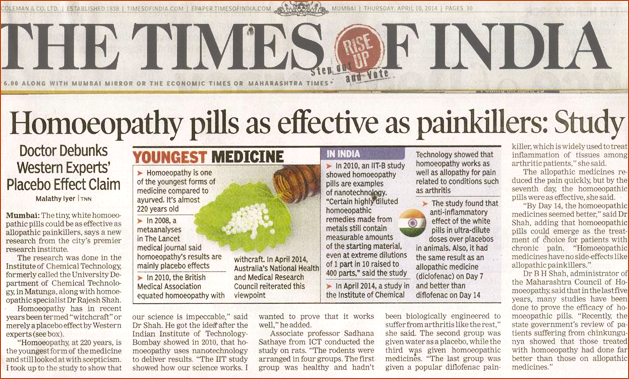Homoeopathy pills as effective as painkillers, finds study
MUMBAI: The tiny, white homoeopathic pills could be as effective as allopathic painkillers, says a new research from the city's premier research institute.
The research was done in the Institute of Chemical Technology, formerly called the University Department of Chemical Technology, in Matunga, along with homoeopathic specialist Dr Rajesh Shah.

Homoeopathy pills as effective as painkillers, finds study
The Times Of India, Apr 10, 2014
MUMBAI: The tiny, white homoeopathic pills could be as effective as allopathic painkillers, says a new research from the city's premier research institute.
The research was done in the Institute of Chemical Technology, formerly called the University Department of Chemical Technology, in Matunga, along with homoeopathic specialist Dr Rajesh Shah.

Article Link: http://timesofindia.indiatimes.com/city/mumbai/Homoeopathy-pills-as-effective-as-painkillers-finds-study/articleshow/33518170.cms
Homoeopathy has in recent years been termed "witchcraft" or merely a placebo effect by Western experts.
"Homoeopathy, at 220 years, is the youngest form of the medicine and still looked at with scepticism. I took up to the study to show that our science is impeccable," said Dr Shah. He got the idea after the Indian Institute of Technology-Bombay showed in 2010, that homoeopathy uses nanotechnology to deliver results. "The IIT study showed how our science works. I wanted to prove that it works well," he added.
Associate professor Sadhana Sathaye from ICT conducted the study on rats. "The rodents were arranged in four groups. The first group was healthy and hadn't been biologically engineered to suffer from arthritis like the rest," she said. The second group was given water as a placebo, while the third was given homoeopathic medicines. "The last group was given a popular diflofenac painkiller, which is widely used to treat inflammation of tissues among arthritic patients," she said.
The allopathic medicines reduced the pain quickly, but by the seventh day, the homoeopathic pills were as effective, she said.
"By Day 14, the homoeopathic medicines seemed better," said Dr Shah, adding that homoeopathic pills could emerge as the treatment of choice for patients with chronic pain. "Homoeopathic medicines have no side-effects like allopathic painkillers."
Dr B H Shah, administrator of the Maharashtra Council of Homoeopathy, said that in the last five years, many studies have been done to prove the efficacy of homoeopathic pills. "Recently, the state government's review of patients suffering from chinkungunya showed that those treated with homoeopathy had done far better than those on allopathic medicines."
YOUNGEST MEDICINE
- Homoeopathy is one of the youngest forms of medicine compared to ayurved. It's almost 220 years old.
- In 2008, a metaanalyses in The Lancet medical journal said homoeopathy's results are mainly placebo effects
- In 2010, the British Medical Association equated homoeopathy with witchcraft. In April 2014, Australia'a National Health and Medical Research Council reiterated this viewpoint.
IN INDIA
- In 2010, an IIT-B study showed homoeopathy pills are examples of nanotechnology. "Certain highly diluted homoeopathic remedies made from metals still contains of the starting material, even at extreme dilutions of 1 part in 10 raised to 400 parts." said the study
- In April 2014, a study in the Institute of Chemical Technology showed that homoeopathy works as well as allopathy for pain related to conditions such as arthritis The study found that anti-inflammatory effect of the white pills in ultra-dilute doses over placebos in animals. Also it had the same result as an allopathic medicine (diclofenac) on Day 7 and better than diflofenac on Day 14